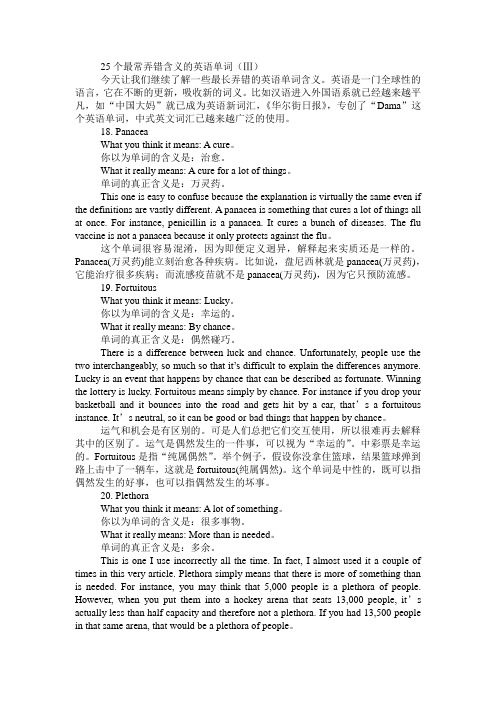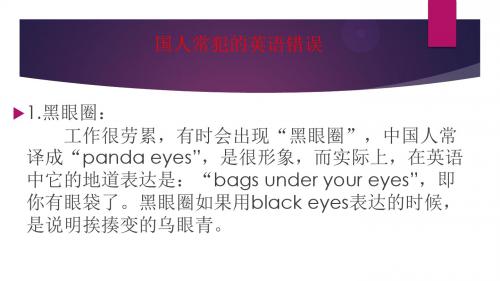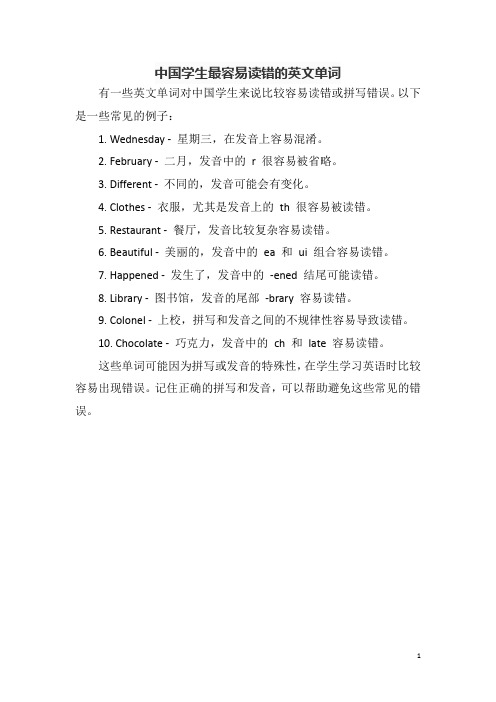中国人最容易用错的25个英文单词
《中国人说英语常见错误》

中國人說英語常見錯誤1. 轉動方向盤Turn the handle.Turn the steering wheel.汽車的方向盤在英語中為steering wheel。
handle的意思是門或杯子的把手。
另外,handle也有直線物體的意思,而車的方向盤是圓的。
方向盤用steering wheel表示。
2. 我的姐姐在公司上班。
My sister is an office lady.My sister works at an office.office lady 是中式英語;work at office的意思是在辦公室工作。
在英語中,沒有office lady這樣的說法。
3. 這條裙子是我打折時買的。
I got this skirt from bargain.I got this skirt on sale.打折正確的英語表達方法應為 a bargain sale或者sale。
如果想說趁打折的時候買的 … 應為get …on sale。
另外,作為名詞bargain還有物美價廉的商品、價格便宜的商品的意思。
說某種商品正在打銷售,可以用be on sale來表達。
4. 她是個明星。
She is a TV talent.She is a celebrity.(電視)演員不可以說talent, talent有具備某種才能或技能的意思,並不代表藝人。
和電視演員最相近的詞是celebrity,celebrity可泛指名人,從中可以聯想到演藝界的知名人士。
演藝界的明星可以用celebrity表示。
5. 我想要一副耳釘。
I want some pierce.I want some pierced earrings.耳釘用英語說是pierced earrings, pierce作動詞時有挖洞的意思。
一般的夾式耳環可以叫做clip-on earrings。
注意earrings要用複數形式。
需要戴在耳洞裏的耳環叫做pierced earrings。
四十个错误英文热门排行榜

四十个错误英文热门排行榜1.here is two people这里有两个人,没错啊,你又念了两次,越念越顺,唉。
难道你没有注意到,动词和后面的人称不一致吗?这里的“is”应该要换成“are”,而且,这里有两个人,英文的说法应该是“There are two people here.”“Here are two people”这种说法,不太合英文的语法。
2.eat medicine“吃药”啊?这又错了吗?英文里的“吃药”的“吃”,不是用这个动词,而是用“take medicine”,比较像中文里说的“服药”。
3.open the light从中文直接翻译成英文,就会有这种“中式英文”出现。
“开灯”的“开”,英文是“turn on”,关灯也绝对不是“close the light”,而是“turn off the light”。
4.special中国人好喜欢用这个字呀,虽然查字典这个字的意思是“特别的”,但是“special”这个字只用来专指纪念性的东西。
所以,要是剪了个很炫的头发,说它很特别,应该用的英文单词是different”(很不一样)或是“unique” (独一无二)。
5.Did you eat?中国人的问候语,就是“吃饱了没”,可是外国人没有这种三餐的问候方式。
所以很多的外国朋友刚来的时候都觉得很奇怪,为什么中国人总喜欢问“吃饱了没”,以为他们要准备请吃饭,结果造成了不少的误会。
6.Where are you come from?中国人问外国朋友从哪来,常常会有这种错误句出现。
一个句子同时出现了“are”、“come”是很离谱的错误。
你可以改说,“Where are you from?”,“Where do you come from?”就可以了。
7.How to spell...?这个字怎么拼?大家都说“How to spell”,外国人完全没有这种说法,正确的说法是“How do you spell...”有个单词不会念,你可以问人家:“How do you say...”或是“How do you pronounce”,而不是“How to say...”或是“How to pronounce...”。
25个最常弄错含义的英语单词(Ⅲ)

25个最常弄错含义的英语单词(Ⅲ)今天让我们继续了解一些最长弄错的英语单词含义。
英语是一门全球性的语言,它在不断的更新,吸收新的词义。
比如汉语进入外国语系就已经越来越平凡,如“中国大妈”就已成为英语新词汇,《华尔街日报》,专创了“Dama”这个英语单词,中式英文词汇已越来越广泛的使用。
18. PanaceaWhat you think it means: A cure。
你以为单词的含义是:治愈。
What it really means: A cure for a lot of things。
单词的真正含义是:万灵药。
This one is easy to confuse because the explanation is virtually the same even if the definitions are vastly different. A panacea is something that cures a lot of things all at once. For instance, penicillin is a panacea. It cures a bunch of diseases. The flu vaccine is not a panacea because it only protects against the flu。
这个单词很容易混淆,因为即便定义迥异,解释起来实质还是一样的。
Panacea(万灵药)能立刻治愈各种疾病。
比如说,盘尼西林就是panacea(万灵药),它能治疗很多疾病;而流感疫苗就不是panacea(万灵药),因为它只预防流感。
19. FortuitousWhat you think it means: Lucky。
你以为单词的含义是:幸运的。
What it really means: By chance。
单词的真正含义是:偶然碰巧。
There is a difference between luck and chance. Unfortunately, people use the two interchangeably, so much so that it’s difficult to explain the differences anymore. Lucky is an event that happens by chance that can be described as fortunate. Winning the lottery is lucky. Fortuitous means simply by chance. For instance if you drop your basketball and it bounces into the road and gets hit by a car, that’s a fortuitous instance. It’s neutral, so it can be good or bad things that happen by chance。
国人常犯的英语错误

国人常犯的英语错误
4.白酒:
很多人喜欢把白酒说成“wine”,其实不然。称为wine的东 西必须具备两个条件,一是里面含有酒精,二是用葡萄酒做的。 White wine其实是“白葡萄酒”,相应的还有red wine,红葡萄 酒。 中国的白酒其实是一种蒸馏而来的酒,我们可以用Chinese spirits来指代中国的白酒,注意哦,这里的spirits是复数形式,表 示“烈酒”;同样表示“烈性酒”的词还有liquor,这些都可以统 称为distilled beverage。distilled是指蒸馏来的,beverage是 指除水以外的饮料。
2.上厕所:
在中国会听到“I want to W.C。”,,每个老外都 知道W.C。是什么意思,却没人这么用,因为这个词很古 老,这种厕所条件非常简陋,现代条件的厕所再用这个词 就不合适了,相当于我们破旧的“茅房”。而且,也不会 当动词来用。 地道的表达是the bathroom,the toilet,the washroom
国人常犯的英语错误
3.烤羊肉串:
许多人把Barbeque和中国的烧烤混淆了。在新西兰 和澳大利亚,Barbeque是指在海边或公园烧烤,一般在 室外。而在中国,羊肉串就很流行,不过那不是 Barbeque,那叫Kebab。两者区别在户外,还在于 Kebab是指串在扦子上并在火上烤,而Barbeque是在热 金属板上烧烤。 Barbeque通常缩写为BBQ或者barbie。
国人常犯的英语错误
1.黑眼圈:
工作很劳累,有时会出现“黑眼圈”,中国人常 译成“panda eyes”,是很形象,而实际上,在英语 中它的地道表达是:“bags under your eyes”,即 你有眼袋了。黑眼圈如果用black eyes表达的时候, 是说明挨揍变的乌眼青。
最容易被中国人误解的英语词汇

sporting house 妓院(不是“体育室”)dead president 美钞(上印有总统头像)(并非“死了的总统”)lover 情人(不是“爱人”)busboy 餐馆勤杂工(不是“公汽售票员”)busybody 爱管闲事的人(不是“大忙人”)dry goods (美)纺织品;(英)谷物(不是“干货”)heartman 换心人(不是“有心人”)mad doctor 精神病科医生(不是“发疯的医生”)eleventh hour 最后时刻(不是“十一点”)blind date (由第三者安排的)男女初次会面(并非“盲目约会”或“瞎约会”)p ersonal remark 人身攻击(不是“个人评论”)sweet water 淡水(不是“糖水”或“甜水”)confidence man 骗子(不是“信得过的人”)criminal lawyer 刑事律师(不是“犯罪的律师”)service station 加油站(不是“服务站”)rest room 厕所(不是“休息室”)dressing room 化妆室(不是“试衣室”或“更衣室”)horse sense 常识(不是“马的感觉”)capital idea 好主意(不是“资本主义思想”)familiar talk 庸俗的交谈(不是“熟悉的谈话”)black tea 红茶(不是“黑茶”)black art 妖术(不是“黑色艺术”)black stranger 完全陌生的人(不是“陌生的黑人”)white coal (作动力来源用的)水(不是“白煤”)white man 忠实可靠的人(不是“皮肤白的人”)yellow book 黄皮书(法国政府报告书,以黄纸为封)(不是“黄色书籍”)red tape 官僚习气(不是“红色带子”)green hand 新手(不是“绿手”)blue stocking 女学者、女才子(不是“蓝色长统袜”)China policy 对华政策(不是“中国政策”)Chinese dragon 麒麟(不是“中国龙”)American beauty 一种玫瑰,名为“美国丽人”(不是“美国美女”)English disease 软骨病(不是“英国病”)Indian summer 愉快宁静的晚年(不是“印度的夏日”)Greek gift 害人的礼品(不是“希腊礼物”)Spanish athlete 吹牛的人(不是“西班牙运动员”)French chalk 滑石粉(不是“法国粉笔”)pull one's leg 开玩笑(不是“拉后腿”)in one's birthday suit 赤身裸体(不是“穿着生日礼服”)eat one's words 收回前言(不是“食言”)an apple of love 西红柿(不是“爱情之果”)handwriting on the wall 不祥之兆(不是“大字报”)bring down the house 博得全场喝彩(不是“推倒房子”)have a fit 勃然大怒(不是“试穿”)make one's hair stand on end 令人毛骨悚然—恐惧(不是“令人发指——气愤”)be taken in 受骗,上当(不是“被接纳”)think a great deal of oneself 高看或看重自己(不是“为自己想得很多”)pull up one's socks 鼓起勇气(不是“提上袜子”)have the heart to do (用于否定句)忍心做……不是“有心做”或“有意做”)What a shame! 多可惜!真遗憾!(不是“多可耻”)You don't say! 是吗!(不是“你别说”)You can say that again! 说得好!(不是“你可以再说一遍”)I haven't slept better. 我睡得好极了。
中国学生最容易读错的英文单词

中国学生最容易读错的英文单词
有一些英文单词对中国学生来说比较容易读错或拼写错误。
以下是一些常见的例子:
1. Wednesday -星期三,在发音上容易混淆。
2. February -二月,发音中的r 很容易被省略。
3. Different -不同的,发音可能会有变化。
4. Clothes -衣服,尤其是发音上的th 很容易被读错。
5. Restaurant -餐厅,发音比较复杂容易读错。
6. Beautiful -美丽的,发音中的ea 和ui 组合容易读错。
7. Happened -发生了,发音中的-ened 结尾可能读错。
8. Library -图书馆,发音的尾部-brary 容易读错。
9. Colonel -上校,拼写和发音之间的不规律性容易导致读错。
10. Chocolate -巧克力,发音中的ch 和late 容易读错。
这些单词可能因为拼写或发音的特殊性,在学生学习英语时比较容易出现错误。
记住正确的拼写和发音,可以帮助避免这些常见的错误。
1。
中国学生容易读错的单词
中国学生容易读错的单词1. throughout:发音为[θruː'aʊt],而不是[θruː'ɔːt]。
2. interesting:重音在第一个音节上,发音为[ˈɪntrəstɪŋ],而不是[ˈɪntərəstɪŋ]。
3. comfortable:重音在第二个音节上,发音为[ˈkʌmfətəbl],而不是[ˈkʌmftəbl]。
4. apartment:重音在第二个音节上,发音为[əˈpɑːrtmənt],而不是[æˈpɑːrtmənt]。
5. actually:重音在第二个音节上,发音为[ˈæktʃuəli],而不是[ˈæktjʊəli]。
6. tomorrow:重音在第一个音节上,发音为[təˈmɒrəʊ],而不是[təˈmɔːrəʊ]。
7. library:重音在第一个音节上,发音为[ˈlaɪbrəri],而不是[ˈlaɪbreri]。
8. delicious:重音在第二个音节上,发音为[dɪˈlɪʃəs],而不是[dɪˈlɪsəs]。
9. tomato:重音在第一个音节上,发音为[təˈmɑːtəʊ],而不是[təˈmɒtəʊ]。
10. coffee:重音在第一个音节上,发音为[ˈkɒfi],而不是[ˈkɔːfi]。
11. photograph:重音在第二个音节上,发音为[ˈfəʊtəgrɑːf],而不是[ˈfəʊtəgræf]。
12. favorite:重音在第二个音节上,发音为[ˈfeɪvərɪt],而不是[ˈfevərɪt]。
13. restaurant:重音在第三个音节上,发音为[ˈrestrɒnt],而不是[ˈrestrɑːnt]。
14. comfortable:重音在第二个音节上,发音为[ˈkʌmfətəbl],而不是[ˈkʌmftəbl]。
15. amazing:重音在第二个音节上,发音为[əˈmeɪzɪŋ],而不是[æˈmeɪzɪŋ]。
中国人最易犯的汉译英错误
9.忽 9.忽…忽, 这些日子天气多变,忽冷忽热。 这些日子天气多变,忽冷忽热。 The weather is suddenly cold and then hot those days. The weather is changeable these days, now cold, now warm. 他的情绪不断变化,忽喜忽悲。 他的情绪不断变化,忽喜忽悲。 His moods kept changing, now happy, now sad.
12.晒黑 12.晒黑 我的皮肤晒得比你黑。 我的皮肤晒得比你黑。 My skin has become blacker than yours. I’ve got a more tanned skin than you. I’ve got more tanned than you.
中国人最容易犯的汉译英错误
1.容易 1.容易 冬天,人们容易感冒。 冬天,人们容易感冒。 In winter, people are easy to catch cold. In winter, people tend to catch. In winter, people are tending to catch cold. In winter, people arቤተ መጻሕፍቲ ባይዱ apt to catch cold. In winter, people are liable to catch cold.
(3)体现或反映(某种方向或利益) (3)体现或反映(某种方向或利益) 体现或反映 例:三个代表 Three Represents The Party should always represent the development needs of China’s advanced social productive forces, always represent the onward direction of China’s advanced culture, and always represents the fundamental interests of the largest number of the Chinese people.
中国人最易误听的英语同音词
中国人最易误听的英语同音词
以下是一些中国人容易误听或混淆的英语同音词:
1. "beach"(海滩)和"bitch"(婊子)
2. "pen"(钢笔)和"pin"(别针)
3. "sheet"(床单)和"shit"(屎)
4. "rice"(米饭)和"lice"(虱子)
5. "bass"(低音)和"base"(基础)
6. "peace"(和平)和"piece"(一片)
7. "flower"(花)和"floor"(地板)
8. "meet"(见面)和"meat"(肉类)
9. "four"(四)和"for"(为了)
10. "sale"(销售)和"sail"(航行)
这些同音词在发音上非常相似,容易导致听力误解或者产生笑话。
对于学习英语的人来说,要特别注意这些词的区分,避免在沟通中出现误解。
72组最容易错的英语单词
1)quite 相当quiet 安静地2) affect v 影响, 假装effect n 结果, 影响3) adapt 适应adopt 采用adept 内行4) angel 天使angle 角度5) dairy 牛奶厂diary 日记6) contend 奋斗, 斗争content 内容, 满足的context 上下文contest 竞争, 比赛7) principal 校长, 主要的principle 原则8) implicit 含蓄的explicit 明白的9) dessert 甜食desert 沙漠v 放弃dissert 写论文10) pat 轻拍tap 轻打slap 掌击rap 敲,打11) decent 正经的descent n 向下, 血统descend v 向下12) sweet 甜的sweat 汗水13) later 后来latter 后者latest 最近的lately adv 最近14) costume 服装custom 习惯15) extensive 广泛的intensive 深刻的16) aural 耳的oral 口头的17) abroad 国外aboard 上(船,飞机)18) altar 祭坛alter 改变19) assent 同意ascent 上升accent 口音20) champion 冠军champagne 香槟酒campaign 战役21) baron 男爵barren 不毛之地的barn 古仓22) beam 梁,光束bean 豆been have 过去式23) precede 领先proceed 进行,继续24) pray 祈祷prey 猎物25) chicken 鸡kitchen 厨房26) monkey 猴子donkey 驴27) chore 家务活chord 和弦cord 细绳28) cite 引用site 场所sight 视觉29) clash (金属)幢击声crash 碰幢,坠落crush 压坏30) compliment 赞美complement 附加物31) confirm 确认conform 使顺从32) contact 接触contract 合同contrast 对照33) council 议会counsel 忠告consul 领事34) crow 乌鸦crown 王冠clown 小丑cow 牛35) dose 一剂药doze 打盹36) drawn draw 过去分词drown 溺水37) emigrant 移民到国外immigrant 从某国来的移民38) excess n 超过exceed v超过excel 擅长39) hotel 旅店hostel 青年旅社40) latitude 纬度altitude 高度gratitude 感激41) immoral 不道德的immortal 不朽的42) lone 孤独的alone 单独的lonely 寂寞的43) mortal 会死的metal 金属mental 神经的medal 勋章model 模特meddle 玩弄44) scare 惊吓scarce 缺乏的45) drought 天旱draught 通风, 拖拉draughts (英)国际跳棋46) assure 保证ensure 使确定insure 保险47) except 除外expect 期望accept 接受excerpt 选录exempt 免除48) floor 地板flour 面粉49) incident 事件accident 意外50) inspiration 灵感aspiration 渴望51) march 三月, 前进match 比赛52) patent 专利potent 有力的potential 潜在的53) police 警察policy 政策politics 政治54) protest 抗议protect 保护55) require 需要inquire 询问enquire 询问acquire 获得56) revenge 报仇avenge 为...报仇57) story 故事storey 楼层store 商店58) strike 打stick 坚持strict 严格的59) expand 扩张expend 花费extend 延长60) commerce 商业commence 开始61) through 通过thorough 彻底的(al)though 尽管thought think 过去分词62) purpose 目的suppose 假设propose 建议63) expect 期望respect 尊敬aspect 方面inspect 视察suspect 怀疑64) glide 滑翔slide 使滑行slip 跌落65) steal 偷steel 钢66) strive 努力stride 大步走67) allusion 暗示illusion 幻觉delusion 错觉elusion 逃避68) prospect 前景perspective 透视法69) stationery 文具stationary 固定的70) loose 松的lose 丢失loss n 损失lost lose过去式71) amend 改正, 修正emend 校正72) amoral 与道德无关的unmoral immoral 同义不道德的amoral。
- 1、下载文档前请自行甄别文档内容的完整性,平台不提供额外的编辑、内容补充、找答案等附加服务。
- 2、"仅部分预览"的文档,不可在线预览部分如存在完整性等问题,可反馈申请退款(可完整预览的文档不适用该条件!)。
- 3、如文档侵犯您的权益,请联系客服反馈,我们会尽快为您处理(人工客服工作时间:9:00-18:30)。
1. IronyWhat you think it means: Something that is funny. 你认为单词的含义是:滑稽的事。
What it really means: Contrary to what you are expecting.单词的真正含义是:事与愿违的。
This is a famous one because so many people get this wrong so often. It’s also kind of hard to explain, so we’ll use an example. The Titanic was boasted about as being 100% unsinkable and then in 1912 it was sunk anyway. That is what is called cosmic irony. When a starving vegetarian eats a pepperoni pizza, that is what is called situational irony.这是一个典型的单词,因为经常有人用错。
解释起来可能有点困难,所以我们还是举例说明吧。
泰坦尼克号号称100%不会沉没,但1912年它还是意外沉没了,这就叫“宇宙反讽”。
要是某个饿得不行的素食者忍不住吃了块香肠披萨,那就叫“情境反讽”。
There are other kinds too, such as dramatic irony and Socratic irony. Believe it or not, sarcasm is actually irony. When you say something sarcastically, your tone and your words mean two opposite things. That is ironic. Irony can be funny but not everything funny is irony.当然还有其他分类,比如“喜剧式反讽”和“苏格拉底式反讽”。
不管你信不信,irony 其实和sarcasm(讽刺)是一个意思。
当说到某件事很讽刺时,你的语调和用词意在表达完全相反的两种情况。
这就是ironic(反讽)。
反讽可以是滑稽的,但并不是所有滑稽的事都可以称得上“反讽”。
2. TravestyWhat you think it means: A tragedy or something unfortunate. 你认为单词的含义是:悲剧或不幸的事。
What it really means: A mockery or parody. 单词的真正含义是:拙劣的模仿或恶搞。
This is another one that people have wrong fairly frequently. You’ve heard people call 9/11 a travesty. Truth be told 9/11 was a tragedy. A travesty is actually a mockery or a parody. One might say that a Weird Al Yankovic album is a travesty. With how often this word is associated with tragedy, we wouldn’t be shocked if that definition were eventually added as an acceptable meaning. Until then, it doesn’t mean anything bad happened.这也是人们经常用错的一个单词。
有人把9.11事件说成travesty,其实他是想说是个tragedy(悲剧)。
Travesty其实是指拙劣的模仿或恶搞。
你可以说艾尔•扬科维奇的专辑是travesty(恶搞的)。
鉴于travesty这个单词总是被人们和tragedy(悲剧)搞混淆,或许以后travesty里面也能加入“悲剧”的含义吧。
不过到目前为止,这个单词跟“不好的事情”完全扯不上关系。
3. UltimateWhat you think it means: The one, the only. The best. 你认为单词的含义是:某个,唯一的,最好的。
What it really means: The last item of a list. 单词的真正含义是:列表中的最后一项。
Some people do actually use this one properly. You may see someone list off a bunch of things and hear them say, “Okay, at the store we need eggs, milk, juice, and ultimately, butter.” That is actually the prop er use of ultimate. There is no other context or added context. It simply means the last one.确实也有人能够正确使用这个单词。
你或许看到过别人写出一串列单,然后听到他们说:“嗯……我们要去商店买点鸡蛋、牛奶、果汁,最后(ultimately)还有黄油。
”这才是ultimate的正确使用方法。
这里不存在其他内容或补充内容,ultimate就表示“最后一个”。
4. ConversateWhat you think it means: To have a conversation. 你认为单词的含义是:进行交谈。
What it really means: Nothing. 单词的真正含义是:压根没有这个词。
Conversate actually doesn’t exist and I’ll prove it to you. Go into a program that underlines words with red if they’re spelled wrong. Now t ype out conversate. Did you see the red line? Conversate was meant to be a mixture of conversation and converse and be used as a verb. However, converse is a verb and there really isn’t a need for a second verb to describe the same action.Conversate这个单词其实是不存在的,这我可以证明。
找个能标红错误拼写的程序,然后输入conversate这个单词,你应该能看到这个单词被标了红色下划线吧?conversate应该是conversation(交谈)和converse(交谈)的混合词,词性是动词。
可是,converse(交谈)本身就是动词,根本就没必要再造一个动词来描述同一个行为了。
5. PeruseWhat you think it means: To skim or browse. 你认为单词的含义是:略读或浏览。
What it really means: To observe in depth. 单词的真正含义是:深入观察。
When you peruse something, you are actually taking a very close look at it.When you’re at a record store and you’re just running through a stack of records, you are just browsing. If you pick up a record and look at the artist, track list, and additional information on the back, then your are perusing.当你peruse(深入观察)某事物时,说明你看得非常仔细。
假设你在唱片店穿过一排排的唱片架,那就是“浏览”。
如果你拿起一张唱片查看背后的艺术家、目录和其他信息,那就叫peruse(深入观察)了。
6. BemusedWhat you think it means: Amused. 你认为单词的含义是:愉快的。
What it really means: Confused. 单词的真正含义是:困惑的。
This is one of the many words on this list that will make you strongly dislike the English language. Despite looking all but identical to the word amused, bemused doesn’t even come close to meaning the same thing. If you are bemused then you are actually confused.这个单词可能本清单中“荣膺”让你讨厌英语的原因之一。
尽管bemused(困惑的)在拼写上跟amused(愉快的)很相似,但这两个单词的含义却并不一样。
如果你bemused,说明你其实很困惑。
7. CompelledWhat you think it means: To do something voluntarily by choice. 你认为单词的含义是:志愿选择做某事。
What it really means: To be forced or obligated to doing something. 单词的真正含义是:被迫或有义务做某事。
This is one that people get wrong and it’s rather understandable. The real definition is very close to the definition people generally use. The difference is the motivation. When people say compelled, they think the person wants to perform the action. In fact, they are forced to do it regardless of their personal feelings. Here’s an example. When you’re in court, you are compelled to give honest testimony. You may not want to, but it doesn’t matter because you have to.这个单词被人们搞错其实倒也情有可原。
